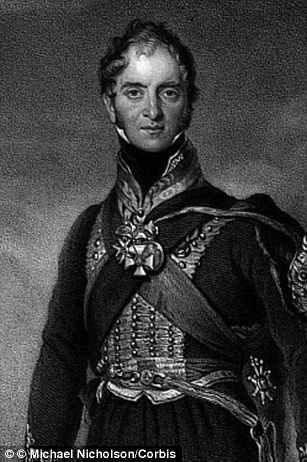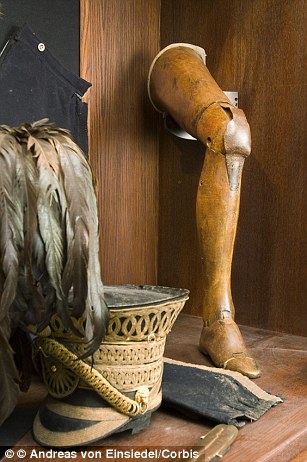Another fine son of Ireland saves the Brits' bacon.
Duke of Wellington was British. United Kingdom of Great Britain and Ireland - Wikipedia, the free encyclopedia
Also, this is what that great member of the Anglo-Irish Protestant Ascendancy said about the fact he was born in Ireland:
"Because a man is born in a stable it does not make him a horse".
Uxbridge wasted his cavalry. After getting run down by French Lancers they were combat ineffective.
No, he didn't.
Lord Uxbrige commanded 13,000 Allied cavalry and 44 guns of horse artillery at the Battle of Waterloo.
At around 2:30pm, at a crucial stage in the battle, he led a charge of the 2,000 heavy cavalry of the Household Brigade and the Union Brigade to push back the French.
The charge succeeded in sweeping the French infantry away but Lord Uxbridge was unable to rally his troops, who ran on in pursuit and were cut up by counter-attacking French cavalry.


First ever prosthetic leg: When Uxbridge lost his leg he is said to have stoically, and in a very British way, remarked 'by God, sir, I've lost my leg'. This wooden limb, the first ever articulated wooden limb, was designed for him and remains in the Cavalry Museum at Plas Newydd, on the Isle of Anglesey
He spent the rest of the battle leading a series of charges by British light cavalry formations, and had eight or nine horses shot from under him.
One of the last cannon shots fired on June 18 1815 hit his right leg - requiring it to be amputated above the knee.
He was close to the Duk of Wellington when his leg was hit, and exclaimed, "By God, sir, I've lost my leg!", to which Wellington replied "By God, sir, so you have!"
After being wounded, Lord Uxbridge was transported to his headquarters in the village of Waterloo.
The remains of his leg were removed by surgeons - without antiseptic or anaesthetics.
Another famous anecdote records the officer as saying 'the knives appear somewhat blunt' as he underwent the horrendous procedure. He also, supposedly, didn't flinch.
In recognition of his gallantry, the Prince Regent created him Marquess of Anglesey and made him a Knight Grand Cross of the Order of the Bath five days after the battle.
According to the account of Sir Hussey Vivian, recorded by Henry Curling in 1847:
Just after the Surgeon had taken off the Marquis of Anglesey's leg, Sir Hussey Vivian came into the cottage where the operation was performed. "Ah, Vivian!" said the wounded noble, "I want you to do me a favour. Some of my friends here seem to think I might have kept that leg on. Just go and cast your eye upon it, and tell me what you think." "I went, accordingly", said Sir Hussey, "and, taking up the lacerated limb, carefully examined it, and so far as I could tell, it was completely spoiled for work. A rusty grape-shot had gone through and shattered the bones all to pieces. I therefore returned to the Marquis and told him he could set his mind quite at rest, as his leg, in my opinion, was better off than on."
The Prince of Orange was born in the Hague on 11 December, 1792, eldest son of William I of the Netherlands and Wilhelmine of Prussia. When he was two, allied British-Hanoverian troops left the Netherlands and French troops swept in to join the anti-Orangist forces. The royal family fled to England. William went on to study at Oxford and in 1811, at 18, became an aide-de-camp to Wellington in the Peninsular War. He became one of the close knit "family" of Wellington's aides, nick-named "Slender Billy."The Grand Monument to the Prince of Orange!
In 1813, Billy returned to the Netherlands when his father regained the throne. In 1814 he was briefly betrothed to the Prince Regent's daughter Princess Charlotte, but Charlotte wasn't keen on either Billy or on living in the Netherlands and ended the engagement.
In 1815 when Napoleon escaped from Elba and returned to power in France, the prince was given temporary command of the Allied forces in the Netherlands until Wellington arrived from Vienna. Billy, who regarded Wellington with something akin to hero worship, was quite willing to relinquish command, but Wellington's relations with the prince's father were less amicable. Partly to mollify King William, Billy was given command of the I corps, though he was not yet three-and-twenty. Young and untried as a commander, Billy ordered troops to form line rather than square three times over the course of Quatre Bras and Waterloo, exposing them to cavalry fire and crippling losses. At Waterloo, when the prince insisted that Baron Ompteda follow the order to form line, Ompteda looked at Billy as though he'd received a death sentence and said simply that in that case he would try to save the lives of his nephews, aged 14 and 15. Both the nephews survived, but Ompteda and dozens of others did not.
Billy was wounded late in the battle and carried from the field by his friend and aide Lord March (son of the Duchess of Richmond, who gave the famous ball at which Wellington received confirmation that the French attack was coming through Quatre Bras).
In An Infamous Army, Georgette Heyer portrays Billy as young and enthusiastic, untried but sympathetic. Bernard Cornwell in Waterloo paints a much more biting picture of an arrogant young royal whose bumbling arrogance costs numerous lives. Cornwell has Richard Sharpe himself shoot the prince he exposes his men needlessly to cavalry fire.
History Hoydens: Different Views of the Prince of Orange
Last edited:























































